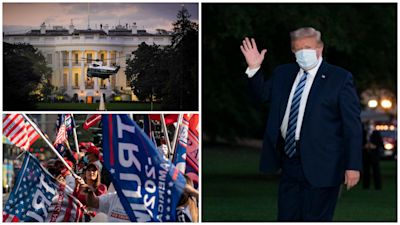Donald Trump compares Covid-19 to seasonal flu after return from hospital for coronavirus treatment

Video report by ITV News Washington Correspondent Robert Moore
Donald Trump has played down the Covid-19 virus by comparing it to the seasonal flu again, just a day after returning from a military hospital for coronavirus treatment.
The US president’s claim, made on Tuesday morning on Twitter, comes just 12 hours after he ostentatiously removed his face mask for an extended period after returning to the White House on Monday night.
In his post, which has now been taken down on Twitter and Facebook, Mr Trump claimed "many people every year, sometimes over 100,000, and despite the Vaccine, die from the Flu," before adding: "Are we going to close down our country?"
He added: "No, we have learned to live with it, just like we are learning to live with Covid, in most populations far less lethal!!!"
The virus left the US president in hospital for three days and has killed more than 210,000 Americans.
Mr Trump's attitude appears to have alarmed infectious disease experts, and suggested his own illness had not caused him to rethink his often-cavalier attitude towards the disease, which has also infected the first lady and more than a dozen White House aides and associates.
Anxious to project strength four weeks from the US Election Day, Mr Trump, who is still contagious with the virus, tweeted that he is planning to attend next week’s debate with Democrat Joe Biden in Miami. "It will be great!" he said.
His doctor, Navy Commander Sean Conley, said Mr Trump had a "restful" night at the White House and that on Tuesday "he reports no symptoms".
On Monday afternoon, shortly before the president’s departure from Walter Reed National Military Medical Centre, Dr Conley had said he would not be fully "out of the woods" for another week.
Mr Trump returned to the White House on Monday night aboard Marine One, gingerly climbing the South Portico steps before removing his mask and giving a double thumbs-up from the terrace.
He entered the White House, where aides were visible in the Blue Room, without wearing a face covering.
In a video released later, he offered a nonchalant take on the virus, contravening the public health warnings of his own administration that Americans take the threat seriously and to take precautions to avoid contracting and spreading the disease as cases continue to spike.
"Don’t be afraid of it," Mr Trump said, while taking deeper breaths than usual.
"You’re going to beat it. We have the best medical equipment, we have the best medicines."
The president’s doctors rushed him on to experimental antiviral drugs and prescribed an aggressive course of steroids that would be unavailable to the average patient.
While most must cope with their symptoms - and fear a turn for the worse - at home and alone, Mr Trump stayed in the presidential suite of one of the nation’s best hospitals, and he is now at the White House, where there is a team of doctors on call with 24-hour monitoring.
Covid-19 has already proven to be a more potent killer, particularly among older populations, than seasonal flu, and has shown indications of having long-term impacts on the health of younger people it infects.
"We have to be realistic in this: Covid is a complete threat to the American population," said David Nace of the University of Pittsburgh Medical Centre.
"Most of the people aren’t so lucky as the president," with an in-house medical unit and access to experimental treatments, added Dr Nace, an expert on infections in older adults.
"It’s an unconscionable message," agreed Sadiya Khan of Northwestern University Feinberg School of Medicine. "I would go so far as to say that it may precipitate or worsen spread."
Mr Biden, who spent more than 90 minutes on the debate stage with Mr Trump last week, said on Monday night he was glad the president seemed to be recovering well, "but there’s a lot to be concerned about – 210,000 people have died."
He added: "I hope no one walks away with the message that it’s not a problem".
The Democrat said he would "listen to the science" ahead of the upcoming debates, adding that the campaigns and the debate commission should be "very cautious" in making plans.
He said: "If scientists say that it’s safe, that distances are safe, then I think that’s fine,” before adding, "I’ll do whatever the experts say."